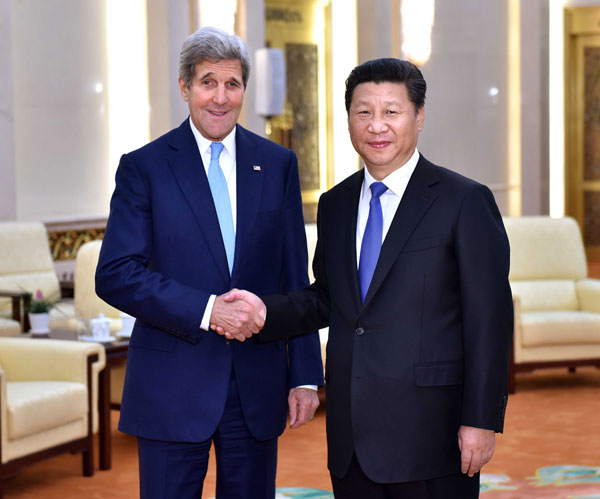Cooperation in public diplomacy needed
Updated: 2015-05-29 07:41
By Chen Yulu(China Daily)
|
||||||||
 |
|
Chinese President Xi Jinping (R) meets with US Secretary of State John Kerry at the Great Hall of the People in Beijng, capital of China, May 17, 2015. [Photo/Xinhua] |
Addressing a meeting of Asian and African countries' leaders in April, President Xi Jinping devised a new pattern for international relations based on cooperation and mutual benefits to make the world order fairer. This concept is a new contribution to international relations amid deepening multi-polarization and economic globalization, and at a time when mutual links, interdependence and integration of countries' interests have reached new heights.
This "new pattern" in international relations is reflected in the way China handles its ties with the United States. At the invitation of US President Barack Obama, President Xi is due to pay a state visit to the US in September. The visit will be a significant occasion to promote this new pattern in bilateral relations, especially because it is expected to advance all-round and strategic exchanges and cooperation in public diplomacy in a variety of fields.
The arrival of a fleet of US commercial ships in China in 1784 started bilateral exchanges between the two sides. Since the founding of New China in 1949, two countries' leaders - from late Chairman Mao Zedong to incumbent President Xi Jinping on the Chinese side and from former president Harry Truman to current President Barack Obama on the US side - have gradually gained a better understanding of Sino-US relations, which have seen deeper cooperation, intensive competition and even conflicts.
With the deepening of exchanges at various levels, the two sides' policy orientation toward each other has become more comprehensive and rational, as indicated by Obama's positive response to Xi's proposal of a "new type of major power relationship" during their meeting in California in 2013.
With the fast-paced development of China's economy and exponential increase in its GDP, the US has taken a precautionary approach to China's rise. Whether or not the US can ease such kind of misgivings depends on whether it can see China's rise in the right perspective and whether the two countries can effectively conduct public diplomacy.
On its part, China needs to forge its image as a responsible power that pursues peace, cooperation, development and win-win results by unveiling its public diplomacy. This is important to ensure the smooth implementation of China's national strategy and foreign policy.
In recent years, China has taken a series of measures aimed at strengthening its public diplomacy toward the US, effectively boosting its global image and soft power. But its public diplomacy has had a passive "response" model, creating a considerable gap between inputs and outputs.
Therefore, for better relations with the US, China should improve its public diplomacy management mechanism, work out a strategic framework and put in place a benign system to link think tank consultations with government decision-making. It should also make government-led multi-channel public diplomatic initiatives and use the Internet more intensely to strengthen the role of new media in the process.
Besides, China should establish a mechanism that can influence American elite opinion when it comes to China-related issues and help push forward strategic exchanges and cooperation between Beijing and Washington in fields such as culture, economy, military and environment.
Close Sino-US strategic cooperation in multiple areas of public diplomacy is not only a strategic need of the global economy and necessary for social development, but also a common responsibility of the two countries. To foster all-round and multi-faceted public diplomatic exchanges and cooperation, think tanks and intellectual circles in both countries should play an important role.
Also, think tanks in both countries should offer policy advice and intellectual support to bilateral public diplomacy in order to forge an influential global communication network. Moreover, they should establish a platform for high-level dialogue that would carry weight in both countries.
The author is president of Renmin University of China, and president of the university's National Academy of Development and Strategy.
- Global health entering new era: WHO chief
- Brazil's planning minister steps aside after recordings revelation
- Vietnam, US adopt joint statement on advancing comprehensive partnership
- European border closures 'inhumane': UN refugee agency
- Japan's foreign minister calls A-bombings extremely regrettable
- Fukushima impact unprecedented for oceans: US expert

 Stars of Lijiang River: Elderly brothers with white beards
Stars of Lijiang River: Elderly brothers with white beards
 Wealthy Chinese children paying money to learn British manners
Wealthy Chinese children paying money to learn British manners
 Military-style wedding: Fighter jets, grooms in dashing uniforms
Military-style wedding: Fighter jets, grooms in dashing uniforms
 Striking photos around the world: May 16 - May 22
Striking photos around the world: May 16 - May 22
 Robots help elderly in nursing home in east China
Robots help elderly in nursing home in east China
 Hanging in the air: Chongqing holds rescue drill
Hanging in the air: Chongqing holds rescue drill
 2.1-ton tofu finishes in two hours in central China
2.1-ton tofu finishes in two hours in central China
 Six things you may not know about Grain Buds
Six things you may not know about Grain Buds
Most Viewed
Editor's Picks

|

|

|

|

|

|
Today's Top News
Liang avoids jail in shooting death
China's finance minister addresses ratings downgrade
Duke alumni visit Chinese Embassy
Marriott unlikely to top Anbang offer for Starwood: Observers
Chinese biopharma debuts on Nasdaq
What ends Jeb Bush's White House hopes
Investigation for Nicolas's campaign
Will US-ASEAN meeting be good for region?
US Weekly

|

|







